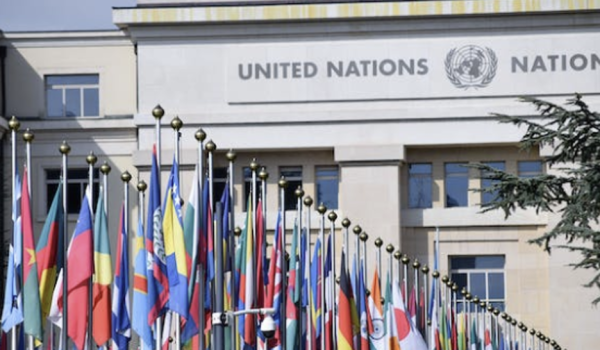Time goes by fast. There are just a few weeks left before YT’s biggest event of the year – the Global Youth Forum. We have already revealed some details of the event’s program, but have mentioned nothing yet about our guest lineup. And today we are about to start. Over the next three weeks we will publish a series of interviews with #YTGlobal’s prominent speakers and experts..
Meet first Silvia Crocitta from Italy and get to known closer her NGO. Silvia is a volunteer in the past, she is a very experienced trainer and is also the president of an NGO. Silvia is passionate about youth and is also a great expert on the topic of education.
You will meet Silvia Crocitta and her NGO on the third day of the forum when she will speak during a plenary session with special guests dedicated to the topic of education.
The story of the NGO of Silvia Crocitta, how did she make her organization, all her struggles, and battles.
Silvia, tell us a bit about yourself. You’re a volunteer, a trainer and the president of a youth movement at the same time. What are these activities about?
My path as a professional in the field of education began in 2007, first as a volunteer in Youth Associations, then as a Secretary-General in various Networks, sometimes as a Representative in many different projects and for very diverse topics.
In 2011, I officially committed myself as a Trainer after getting involved in instructing trainers for the SALTO-Youth channel, and immediately after that I left Europe to volunteer and enhance youth associations and movements in the Middle East.
All of my career is reflected in my current job, I am devoted to what I believe and what I have experienced, and thankful for my choices and those professionals and colleagues who have trusted in my skills.
Today I’m focused on supporting youth in all possible ways, and I am actively committing my NGO and the Federation to enhance the resources (both material ones and human) to build a better future, to provide jobs for young people and opportunities abroad, and in the next few months we will start with EVS too, all topics included.
How are you or your activities connected with the Global Forum’s topic of unemployment and education?
For several years now the NGOs I am serving as a professional have invested time and effort to solve the issue of youth unemployment in Europe (and not only in Europe); we have also tackled the pressing issue of employment in the South of Italy, and we have conducted research and have supported local political figures in better understanding the sectors where intervention is appropriate.
This has happened also in cooperation with partners in other countries (e.g.: Latvia, Spain, etc.), and it has been fruitful enough to draw useful comparisons, globally, on how we can connect education and unemployment: this will be my primary focus and task during the Global Forum.
What do you think of the youth unemployment problem? What are the obstacles that young people face in the transition from school to career?
This may sound repetitive but the main problem is the stagnant economy we have faced since the global crisis (2008 onwards): statistics from Eurostat report youth unemployment (on a double basis ratio/rates) as a very high percentage all over Europe (Greece, Croatia, Spain, Portugal, Slovakia being the worst cases, unfortunately), and, of course, the crux of the matter is that young people face challenges in obtaining job offers.
Sadly, even the EU Youth Strategy for 2010-2018 foresaw this situation, and even though there has been some improvement, many countries are still mired in this nightmare, and many young people decide to prolong their studies, to pursue more internships, to try to get even basic experience, and, in some countries, the theory and the practice in the Universities do not properly prepare young people for the current job market.
It is a chain that must be broken somehow, and both sides (Institutions and Youth) should listen to each other – but this is not easy.
I know that you’re connected with official institutions in the EU. What is the EU position on this? Do the authorities understand the situation? And what is their main strategy, let’s say.
Europe understands the global situation, and the details are quite clear and research-based. And it is not new information, actually.
The European Commission, for example, has established a complete and efficient plan on how to increase the youth employment rate: they have formulated a series of Key Actions to make it possible (e.g.: Youth on the Move, Youth Guarantee proposal, Youth Employment Package, etc.), and in various ways they have worked hard on those matters.
Plus, they have detected in many cases a specific failure in filling vacancies (inadequate wage conditions, lack of skills, limited geographical mobility).
Let’s also not forget the Education Programmes that the EU launched last year for Education, Training and Sports (ERASMUS+, Creative Europe and H2020), the ongoing strategy following benchmarks based on results achieved and the efforts of the National Agencies in tackling qualitative project importance.
In my opinion, yes, they are making a lot of effort, even if sometimes young people do not entirely see it, and I have to admit that there is lack of information too.
It is a fact that we need to work on this.
What can young people do to position themselves well in the job market?
Good question! As a young person, still, I would say to be aware of the rights we have: they are there for us, and we should stand on our rights and not drift into the so-called “black-market”, for example.
We should all study hard, and consider the mobility opportunities we have and the grants we can get also if we are not in a good economical position: there are plenty of financial supports available, and this is truly working even if bureaucratic barriers seem high, but the resources available to us are worth pursuing for our future.
We should all focus on useful objectives, and not get involved in a thousand things: it is better to complete an efficient performance in one activity than to enroll in 5 and reach less than half of the objectives.
Another tip can be to not lose hope, and I know it is not easy, but for the future of Europe: seek dialogue and understanding, find a balance and avoid stereotyping.
That would be much better.
Last couple of questions about the Youth Time Global Forum. What would be the keynotes of your speech?
I will be discussing the link between education and youth unemployment, trends and facts, data and EU opportunities.
I hope it will be helpful enough and provide a platform to debate.
What do you expect from the Youth Time Global Forum? What are your personal goals?I would be glad to enjoy the creativity of competent young people who want to introduce their own hopes, and, for sure, to make all my experience a gift to the entire meeting. To talk and to discuss, to inform and to get connected: this is the direction and my main strategy to communicate with people, and it is extremely profitable as a human and as a professional.
Read more about similar stories to NGO and Silvia Crocitta here.
Opportunity To Volunteer In The Democratic Republic Of Congo
Support us!
All your donations will be used to pay the magazine’s journalists and to support the ongoing costs of maintaining the site.
Share this post
Interested in co-operating with us?
We are open to co-operation from writers and businesses alike. You can reach us on our email at [email protected]/[email protected] and we will get back to you as quick as we can.










